- 埃肯
- 可持续发展
- 政策、战略和报告
- 以前的报告和相关信息
- 2018 年可持续发展报告
- 埃肯 2018年可持续发展报告
埃肯 2018年可持续发展报告

埃肯简介和可持续发展报告
关于埃肯和埃肯的业务
埃肯成立于 1904 年,是非常注重环保的金属和材料制造公司,处于世界领军位置。埃肯是一家完全一体化的生产商,从石英、硅和下游有机硅特种产品以及特种硅铁合金和碳材料,形成了一整个硅价值链。埃肯拥有 6,200 多名员工,从事四个业务领域:有机硅、硅材料、铸造产品和碳素。
公司总部设在奥斯陆,在全球拥有 31 个生产基地,有一个庞大的
销售处和代理商网络,与客户密切联系,能进入
具有吸引力的终端市场。
埃肯于2018年3月22日在奥斯陆证券交易所重新上市。
2018年埃肯 的总营业收入为 258.87 亿挪威克朗,
息税前利润为 57.93 亿挪威克朗。
愿景和价值观
埃肯的愿景是“提供先进的硅、有机硅和碳素解决方案,为我们遍布全球的利益相关者创造价值,助力创建可持续的未来”。
我们的价值观是 尊重、参与、精准、持续改进。
有关 2018年的完整财务报表, 请参见此处的年度报告。
埃肯的可持续发展工作
埃肯的宗旨是“提供先进的有机硅、硅产品和碳素解决方案,为我们遍布全球的利益相关者创造价值,助力创建可持续的未来”。对埃肯来说,可持续发展意味着参与应对世界面临的巨大挑战。
我们的产品提供解决方案,以满足时代大趋势(包括日益增长的能源需求、不断增长的人口、快速城市化和数字化)驱动的市场需求。我们相信,可持续发展既是一项责任,也是我们在行业中抢占领先地位、并在未来保持竞争力的先决条件。
埃肯将可持续发展视为一项承诺,我们在 28 个国家 / 地区的 6200 名员工是实现这一承诺的保障。集团利用技术的力量,努力改进硅、有机硅和碳材料的生产,创造新的创新解决方案和商业模式,促进未来的可持续发展。这就是埃肯的思维方式。1904 年 Sam Eyde 创立了埃肯,1918 年 Carl Wilhelm Söderberg 开发出 Söderberg 电极,从那以来,一贯如此。他们的工作决定了埃肯和全球工业的未来。
由于企业社会责任涵盖了广泛的主题,我们去年开始了一个审核流程,以确定哪些主题对埃肯最为重要。经过三年的重组和再定位,公司从
传统的硅和硅铁生产商转变为一体化的硅基材料供应商,从石英采矿到各种基于硅和有机硅的特种产品,覆盖了整个价值链。2018 年 3 月,埃肯在奥斯陆证券交易所重新上市,这就为我们提供了一个更全面地与利益相关者在可持续发展领域进行互动的好机会。
与利益相关方的接触
与利益相关方的接触
与利益相关者的合作和对话,对埃肯来说至关重要,因为无论我们在世界何处经营,无论是在挪威的小镇还是中国的大城市,我们都力求成为良好的邻居和有价值的社区成员。埃肯的许多工厂都是经济基石,对当地社区来说非常重要,为当地社区提供税收、就业、基础设施和社区发展的机会。作为长期合作伙伴,埃肯重视与邻居、地方政府和其他合作伙伴(包括研究机构、客户和供应商)的开放式对话。
埃肯的利益相关方:
- 股东、董事会、所有者
- 顶层管理者
- 客户
- 员工
- 地方和国家主管部门
- 供应商
- 当地社区、员工家属
- 工会、工会代表
2018 年,埃肯开发了一款利益相关者参与工具,帮助利益相关者参与组织相关事务,并实现更彻底周全的影响评估。目前正在测试该工具,我们计划在 2019 年进一步开发并将其在其关键部门实施。我们的目的是更好地了解我们的利益相关者参与情况。

埃肯的年度内部利益相关者参与度调查会解释我们与利益相关者接触与互动的方式和地点。调查参与者会被问到有关典型的利益相关者参与类型的问题。
由于与利益相关者的合作和对话对埃肯来说至关重要,因此我们要求内部调查的参与者描述与其利益相关者的整体关系。80% 的受访者表示他们与利益相关者建立了基于信任的关系
,78% 的受访者表示他们与利益相关者建立了长期关系。 很少有参与者回答说,与利益相关者的关系是基于冲突(5%)和有限理解(3%)。
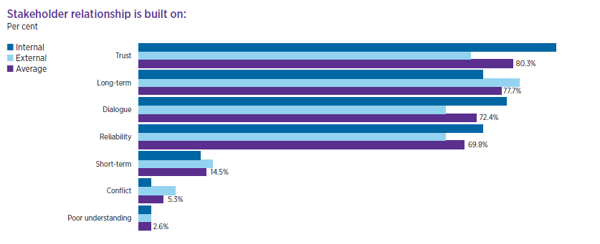
重要性评估
为了遵守全球报告倡议 (GRI) 以及 2018 年埃肯重新上市后产生的新利益相关者格局,集团去年与利益相关者进行了更广泛的互动和沟通。根据埃肯与内部和外部利益相关者的全面对话,重要性评估表凸显了埃肯在可持续发展中的优先事项。
在我们的重要性评估中,优先级最高的重要主题位于表格的右上角。我们的报告涵盖了这些主题。
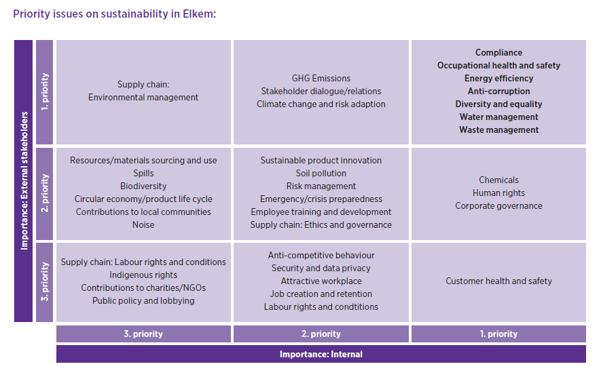
政策和报告
埃肯的企业社会责任管理在以下流程中进行了定义:
- 埃肯的一般政策
- 埃肯的企业社会责任政策
- CSR指导委员会的授权
- 行为准则
- 举报
- 反腐败政策
- 竞争法合规政策
埃肯的一般政策由董事会批准,提供的是整体战略方法,而其他程序则由企业管理层批准,提供的必要的详细信息。
埃肯的企业社会责任报告属于年度可持续发展报告的一部分,年度可持续发展报告根据 GRI 标准编制,并符合奥斯陆证券交易所关于企业责任报告的指导方针。
承诺
埃肯发展业务的方式符合《巴黎气候协议》和《联合国可持续发展目标 (SDG)》。作为联合国全球契约的成员,我们的业务符合《联合国全球契约》的十项原则。我们遵守《联合国人权和商业指导原则》,并已发布有关《英国现代奴隶法案》的最新声明。
埃肯遵守挪威企业政策委员会 (NCGB) 颁布的 " 挪威企业治理行为准则 " 的原则。本行为准则的目标是,在挪威受监管市场上市的公司将实行企业治理,也就是在股东、董事会和高级管理层之间进行比法律要求更全面的职责划分。
埃肯是《责任关怀全球宪章》的成员,这是化工行业推动环境、健康、安全和产品安全改进的全球倡议。其中,埃肯承诺在化学品的生命周期之中对化学品进行安全管理。埃肯致力于遵守国际监管要求,并根据联合国全球统一化学品分类和标签体系(GHS)或其国家实施规定,为其所有适用产品提供安全数据表(SDS)。
埃肯是各个国家国内组织和欧洲行业组织的活跃成员,例如欧洲合金、欧洲金属、欧洲化学工业委员会 (CEFIC) 以及挪威和法国的行业协会。
目标
我们设立了宏大、同时又可实现的目标,来解决材料的可持续性问题。这将使利益相关者(从员工到投资者)能够在未来几年内监控我们的进展。以下目标反映了我们参与和报告可持续发展的总体管理理念。本报告的每个章节都包括与材料可持续性相关的具体目标,并在 2017 年可持续发展报告中进行了介绍。

治理和合规性
超越法律规定
治理和合规是创造价值和建立信任的先决条件。埃肯的严格道德标准适用于全球所有员工,我们开展培训,使员工能够做出正确的决策并遵守我们的标准。
埃肯相信良好的公司治理需要集团所有参与方之间的坦率、信任与合作:股东、董事会和高级管理层、员工、客户、供应商、公共机构和社会。
埃肯必须向同事、业务合作伙伴和整个社会宣传我们的价值观和业务标准。我们的治理文件规定了开展业务的原则。这些适用于所有埃肯实体。董事会批准了埃肯的治理结构。
我们的行为准则基于诚实和尊重的原则,无论我们在哪里开展业务,都必须遵守。企业社会责任是埃肯商业文化的重要组成部分。埃肯是《联合国全球契约》的签署方,埃肯的企业责任的定义是基于《联合国全球契约》中有关人权、劳工权利、环境和反腐败的十项原则。
合规
埃肯致力于完全遵守适用的规则和法规,无论我们在世界何处运营。合规是每个业务部门的责任,但也通过公司内部董事会系统和埃肯董事会说明中定义的每月业务审查来密切跟踪。
埃肯董事会认可 " 挪威公司治理行为准则 "(以下简称 " 准则 "),该准则最近修订于 2018 年 10 月 17 日,并由挪威公司治理政策委员会 (NCGB) 发布。行为准则可见 http://www.nues.no/
所有员工都接受了埃肯行为准则的书面培训,并须在文件上签名,以确认他们理解并承诺遵守该准则。这包括与商业道德、社会责任相关的埃肯政策培训,以及了解当地文化和习俗如何在不同情况下对可接受内容看法的影响。目标群体还需要接受埃肯反腐败和竞争法合规政策的培训。销售、营销和采购资源也接受反腐败培训。负责供应商审核的埃肯员工接受使用公认的国际审核标准和工具的额外培训。
埃肯首席执行官是埃肯企业社会责任政策和计划的正式所有者,同时管理文件需经董事会的批准。董事会批准可持续发展报告和年度报告。CSR 指导委员会负责可持续发展报告。
每个所在地和职能部门都有责任共同了解埃肯的企业社会责任政策如何影响其特定的工作环境。他们还负责制定必要的程序和程序,确保完全合规。
2018 年事件
2018 年未发现违反法律法规的重大事件。
反竞争行为
埃肯的总体政策是严格遵守适用于其业务的相关法律法规,进行强有力的公平竞争。为确保集团范围内的合规性,埃肯制定了竞争法政策和手册,其中描述了违反竞争法或可能违反竞争法的行为。
所有埃肯业务部门、员工和代表都应严格遵守竞争法。任何违反竞争法的行为都将被视为严重违反了员工应履行的对埃肯的义务。被视为有反竞争风险的埃肯员工必须在竞争法政策和手册上签字,并参加由埃肯安排的竞争法培训。业务单位的领导负责采取措施,在其各自的单位内实施埃肯的竞争政策。
2018 年的事件
2018 年未发现任何反竞争事件。
环境合规
环境影响是埃肯的主要关注领域之一。我们的 EHS 理念是运营资源高效型的工艺流程,最大限度地减少整个价值链中的负面环境影响。因此,埃肯始终遵守环境法律法规的规定。各工厂以及公司 EHS 部门和管理层开展业务审查来跟进环境合规性。即使在许可水平和法律限制范围内,所有环境偏差都进行了记录、调查和管理,并从中吸取教训,并采取行动避免再次发生。
2018 年,并没有报告曾出现导致环境影响风险的材料偏差。然而,在某些工厂中,存在与运行标准不符的短期微小偏差。这些问题得到了迅速解决,并没有超过年度限制,也未遭受行
政处罚或罚款。
2018 年,中国环境法规普遍收紧,我们在中国的工厂也受到了中国环境部门的严格监督。根据突然实施的新法规,我们的一些生产活动被暂时关闭,并被命令投资新的减排系统。我们完全遵循这些要求,所有相关生产活动已恢复到运行状态。
2018 年的事故
2018 年没有造成环境影响风险的重大偏差。
反腐败
埃肯不允许、也不容忍任何形式的腐败行为。埃肯的反腐败政策适用于整个集团和全球各地。除了 关注EHS(环境、健康、安全) 问题之外,反腐败也是我们的首要任务。本政策解释并详细说明了针对埃肯员工、代表和合作伙伴的反腐败政策的内容和影响。所有存在腐败风险的埃肯员工必须在反腐败政策和手册上签字。
埃肯在几个腐败风险较高的国家 / 地区开展业务。埃肯还向位于透明国际腐败感知指数最低级别(即腐败水平非常高)的国家 / 地区的公司销售产品。埃肯对集团范围内和全球范围内的所有运营进行风险评估,同时对上述高风险国家进行特别审查。所有向埃肯提供原材料、商品和服务的供应商都要根据埃肯在环境、健康和安全、社会责任、反腐败以及合法合规的要求进行资格预审。 您可以在第 78 页的 " 社会影响 " 一章中阅读更多关于我们供应商要求的信息。腐败风险举例:在获得公共机构批准时雇佣专业顾问、使用代理商和合资企业(包括当地合作伙伴)。
在一个腐败被视为严重问题的新国家 / 地区进行业务安排时,通常要进行风险评估。埃肯将执行诚信尽职调查,以评估与企业社会责任(包括腐败)相关的不同风险。尽职调查可以通过外部专家进行,并定期进行复审。2018 年埃肯没有进入任何新国家/地区开展业务。
埃肯还对集团内部位于腐败风险高的国家 / 地区的公司进行销售映射。该映射可以让营销部门意识到这些国家 / 地区存在的潜在道德风险。该映射涉及客户评估、企业社会责任政策沟通、销售文档、交易透明度以及使用代理商和分销商时埃肯标准的应用等。
所有存在腐败风险的埃肯员工必须在反腐败政策上签名并记录在线学习的结果。这涉及以下人员:
- 企业管理层
- 事业部管理团队
- 事业部财务经理
- 工厂财务经理和控制员
- 财务和信贷管理人员
- 公司业务支持人员
- 技术管理团队 / 部门领导
- 所有项目经理
- 研发部门的所有经理
- 所有销售和营销人员
- 所有采购人员
- 生产经理
- 子公司总经理
- 物流 / 供应链 / 原材料领域的主要经理
每个埃肯业务单位都有责任了解与反腐败相关的具体挑战、运营相关的反腐败法规,并制定适当的反腐败指南和措施。
我们的目标是在员工入职第一年内对目标群体中的 100% 人员进行培训。2018 年,除了最近加入埃肯并从那时起接受过培训的少数个人外,我们已实现了这个目标。
埃肯的反腐败政策是我们企业社会责任原则(CSR)的一部分,在很大程度上被包括在我们与代理商、分销商、合作伙伴、供应商和客户所签合同之中,必须向其沟通和宣传。这些文件也可在我们的网站上找到。所有新供应商必须签字确认他们已理解并接受埃肯的企业社会责任原则。
2018 年的事件:
2018 年未发现任何腐败事件。
目标

能源和环境
零伤害理念指导着我们的工作
埃肯致力于成为一家具有环保意识的公司,营造安全健康的工作环境。 我们的环境、健康和安全 (EHS) 工作是基于零伤害的理念。
零伤害理念意味着我们要保护在埃肯所有经营场所工作的每一个人的健康和安全。这也意味着,在整个价值链中,我们的运营采用资源高效的流程,以期最大限度地减少对环境的负面影响。
基于先进的生产技术,埃肯将自然资源转化为社会绝对依赖的产品。由于近期的发展,埃肯已成为一个综合价值链,涵盖了从石英到硅和有机硅的各个生产领域。我们工艺流程的每个步骤都有其环境挑战,我们相信这些挑战都以可持续的方式进行应对。我们的可持续发展方法基于尽可能高效生产的一般原则,并最大限度地利用所有输入流以避免浪费。
将石英转化为硅是一个高温熔炼过程,会消耗大量能量。由于我们几乎所有冶炼厂的主要能源基础都是水力发电,因此电力供应不会对气候产生影响。然而,该工艺本身会使用化石碳、木炭和木屑等碳源作为化学转化的还原剂。这就会排放二氧化碳、氮氧化物和二氧化硫。二氧化碳的排放是这个工艺流程所固有的,使用当今技术无法完全消除。因此,我们的主要战略是,在开发未来的碳中和技术的同时,尽可能减少当前技术对环境的影响。我们所采取的措施包括增加工艺流程中的木炭和木屑量,将化石碳替换为生物碳,重建炉体以减少熔炼过程中产生的氮氧化物,以及使用更多低硫原料来减少二氧化硫的排放。 所有这些都对我们的环境
足迹产生了显著的积极影响。
2018 年,埃肯向董事会提交了最新版环境战略,承诺了以下几点:
- 无论埃肯在世界何处运营,都完全遵守所有适用的环境法规。
- 无论埃肯在世界何处运营,都要树立并维护强大的环境声誉。
- 根据对我们的生产对环境影响的了解,确保可持续性生产,控制废弃物的排放。这也适用于相关环境法规较弱或不存在的国家 / 地区。
- 加强我们在技术和材料开发方面的地位,以减少全球温室气体的排放。
该战略引入了一套全面的 KPI季度报告,涉及能耗、往大气和水体中排放的废弃物数量以及废物 / 副产品。
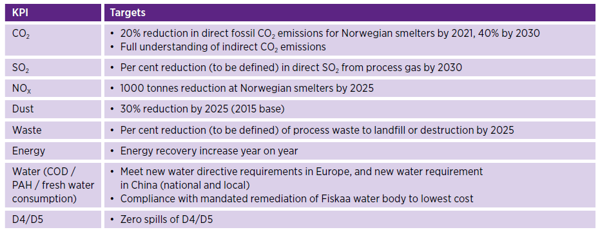
能源:能耗
能源是埃肯生产中的关键投入要素,代表着巨大的成本。保持能源效率和可持续地使用能源,对于确保必要的能源供应、减少我们的全球温室气体足迹来说至关重要。新的监管框架(如特许权、指令、税收和公共支持形式的积极刺激措施)使得能源效率更加重要。
硅、硅铁和铸造合金都在电弧炉中生产,所以埃肯价值链的某些部分非常耗能。埃肯的熔炉每年消耗的电能接近5 TWh。埃肯的其他工艺流程的能源消耗明显较低,总计 1.4 TWh。
埃肯是废热利用领域的工业先驱,在二十世纪七十年代已经安装了第一台用于熔炉的能量回收系统。熔炉回收的热量可以用作区域供热的热水、用于其他生产过程的蒸汽以及用于产生新电力。 电力被出售回电网,而热水和蒸汽在工厂内外都可以使用,被供应给每个工厂附近的其他公司和社区。
对总能耗进行全球记录尚未被优先考虑,因为其中很高的百分比与炉体生产有关,并且在公司层面上记录得很好。随着我们更新的战略和更详细的报告系统的出现,对全球能耗进行记录将从 2019 年起开始实施。
2018 年,埃肯全球总耗电量为 6228 GWh,与 2017 年的 5279 GWh相比,有所增加。这是因为我们整合了永登硅工厂、星火有机硅工厂,同时巴拉圭Limpio铁硅工厂开始投产。
2018 年总耗电量为 6,228 GWh,超过 85% 发生在接近 100% 可再生能源发电的国家或地区。能源消耗的增加主要与刚加入埃肯的新工厂有关。
在全球范围内,我们的工厂共回收了 645 GWh 的热量和电力,与之前的689 GWh相比,有所下降。这是由于我们希库蒂米工厂的产能较低。Thamshavn 和 Bjølvefossen 工厂在 2018 年共发电 209 GWh。2016 年至 2017 年,Bjølvefossen 能源回收系统进行了翻新和升级,而 2018 年则保持稳定。到 2020 年,我们 2018 年开始的一个批准战略投资项目将建成,萨尔顿工厂将额外回收 275 GWh 的新电力。
埃肯没有保存工业流程之外的全球能耗记录,因为这种能耗占总能耗的很小比例,收集起来非常耗时。我们的目的是:随着时间的推移,努力改善我们的辅助电源和燃料消耗的记录
热水和区域供热有许多用途,包括在工厂内加热原材料、为当地社区的公共建筑和体育场馆供热,以及销售给需要热量的陆地养鱼场等公司。
按照总耗电量占比来计算,由于我们收购了没有能源回收设施的新工厂,我们回收的电力和热量从 2017 年的 13% 下降到 2018 年的约 10%。
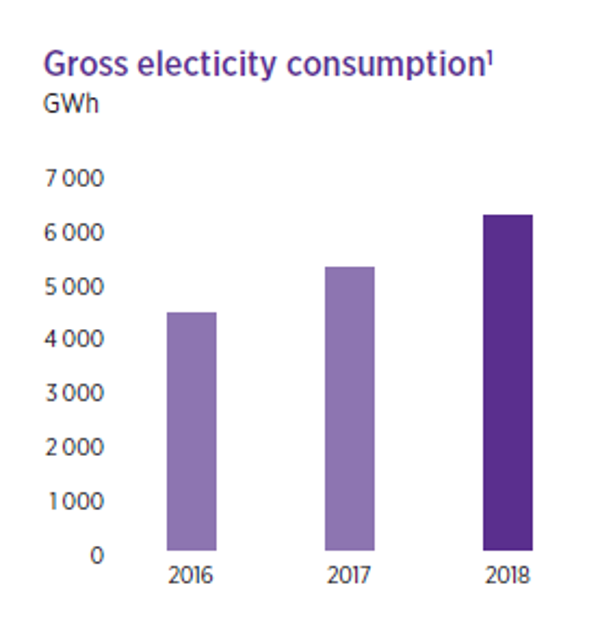
1)2016 年的数字不包括埃肯拉纳、星火和永登在内。2017 年的数字不包括埃肯永登。
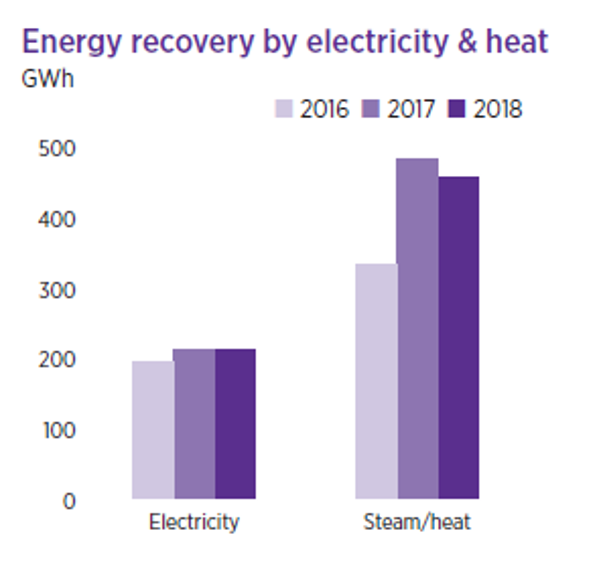
还原材料的消耗量
埃肯的电弧炉在冶金工艺流程中使用的化学还原材料既有化石碳又有生物碳。2018 年,埃肯全球化石还原材料的总使用量为 726,267公吨,而 2017 年为 695,004公吨。
根据市场条件和产能利用率,每年的消耗量会有所不同。化石还原材料用量的增长主要是由于 2018年我们整合了永登硅材料工厂。
2018年,埃肯全球可再生还原材料消耗总量为 364,424 公吨,比 2017年增长了 4%。
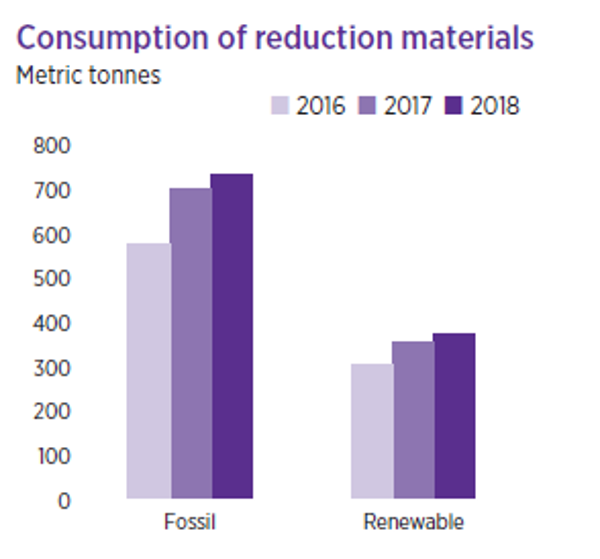
废弃物处理
随着埃肯业务范围的扩展,硅和有机硅生产中涉及到很多化学反应,我们的废弃物的流动特性发生了变化。埃肯的传统冶炼活动产生的废料主要由无害无机材料组成,如渣、产品颗粒、石英颗粒以及木屑和煤炭产生的少量有机颗粒。尽管如此,我们已经启动了大量的项目,以回收和再利用而不是填埋各种废弃物。通过创造新产品和更好地利用原材料,其中许多项目都取得了很大的成功。
对于有机硅而言,不同生产过程中产生的有机废物和有害废物含量要高得多。危险废弃物主要由经过认证的外部供应商管理,而其他废弃物则会被焚烧或填埋。我们还启动了许多项目,以减少源头处的废弃物,并回收化学品以供重复使用,而不是销毁或沉积它们。
有几家工厂的目标是实现零垃圾填埋,在过去几年中显著减少了垃圾填埋量。2018 年垃圾填埋量为 195,000 公吨。其中约 1,300 公吨是危险废物,已根据当地公共法规进行管理。2018年没有发生重大泄漏,即具有“持久环境影响”的泄漏。
然而,发生过储罐设施泄漏事件,但对环境没有重大影响。
排放
有了当今的技术,要在工业规模上生产各种金属和材料,就必然会排放各种物质,不加以控制的话,会产生很大的危害。其中包括二氧化钛、氮氧化物、二氧化硫、多环芳烃和粉尘。由于其中一些是我们生产过程中固有的,因此排放水平会随着年产量的变化而变化。埃肯不断采取措施,努力减少这些排放,并开展专门的研发活动,处理所有主要的排放物。
二氧化碳排放和交易计划
我们生产过程中二氧化碳总排放量的 75% 以上来自熔炼过程。由于无法直接测量,因此排放量是根据原材料(焦炭和煤炭)中碳含量(TC)的第三方证书计算的。其他来源(包括供热和燃料)的二氧化碳排放量是基于符合欧盟排放交易体系(EU ETS)指南的标准转换系数而计算的。
我们的大多数冶炼厂都遵循欧盟排放交易体系及其外部修订方案的规定。作为欧盟体系的一部分,自 2013 年开始,埃肯每年平均获得 120 万免费配额,以避免生产线从欧洲转移到没有碳交易计划的其他国家 / 地区时而发生碳泄漏。当发现挪威的冶炼厂所分配的免费配额比欧洲其他国家少时,我们提出了申诉。于是,2018 年底,埃肯两家挪威冶炼厂的免费配额数量都增加了。
2018 年,我们生产工艺流程中的二氧化碳总排放量为 254 万公吨。由于市场条件和产能利用率的变化,这个数值每年也都有所不同。在过去的几年里,我们的二氧化碳排放总量有所增加。所有这些都可能与扩大生产
直接相关。2017 年,埃肯在挪威摩城收购了一个工厂,其中有 2 座熔炉,2018 年又在中国收购了一个工厂,其中有4座熔炉。所有这些都是现有的生产设施,不会增加挪威或中国的二氧化碳总排放量。此外,埃肯还在巴拉圭启动了一座熔炉,提高了巴拉圭的二氧化碳排放量。然而,该炉由水力发电运行,将生物碳用作还原剂,使其操作接近碳中和。
二氧化碳净排放取决于提高产量和增加非化石来源的还原材料的数量。我们的目标是到 2021 年将挪威冶炼厂的化石碳足迹减少 20%,到 2030 年减少 40%。我们正在与合作伙伴合作,开发更高效、更环保的(采用了木炭的)硅和硅铁生产。
二氧化碳
2018年,埃肯排放了 254 万公吨的来自于化石燃料的二氧化碳,比 2017年增加了 30%。这一增长主要归因于我们集团内的工厂的增加。
大约 75% 的二氧化碳总排放量是在冶炼厂的还原过程中产生的,其中碳 (C) 与石英中的氧发生反应,生成了硅 / 硅铁。
我们的目标是到 2021 年,将挪威冶炼厂20%的化石燃料排放量替换为生物碳的排放量。2018 年的生物燃料的排放量为 313,500公吨,相当于我们二氧化碳排放量的 20.7%。生物燃料所排放的二氧化碳源自硅和硅铁熔炼厂中用作替代原料的木屑和木炭。
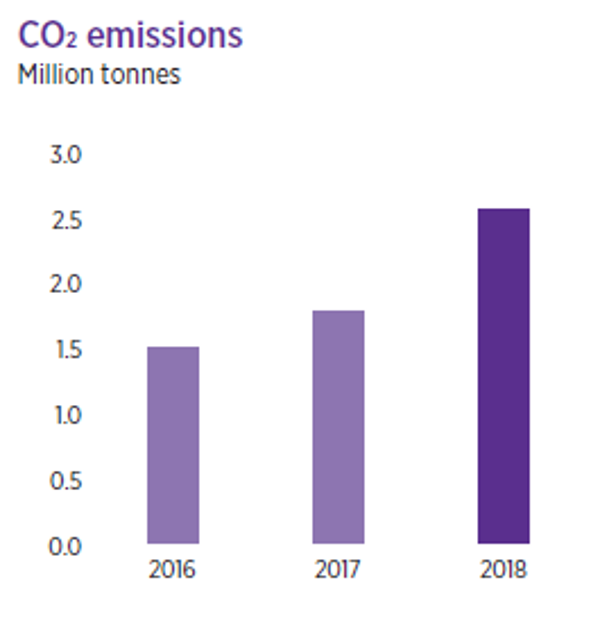
其他排放量
埃肯排放了大量氮氧化物、二氧化硫和粉尘。排放量主要因生产量而异。
氮氧化物
埃肯的氮氧化物排放量从 2017 年的 7,110 公吨下降到 2018 年的 7,070 公吨,包括新工厂在内。排放量的减少是我们工厂所采用若干举措和项目的结果,主要由挪威氮氧化物基金支持。埃肯的挪威冶炼厂中,
氮氧化物排放量从 2017 年的 5774 公吨减少了 5%,降到 2018 年的 5462 公吨。
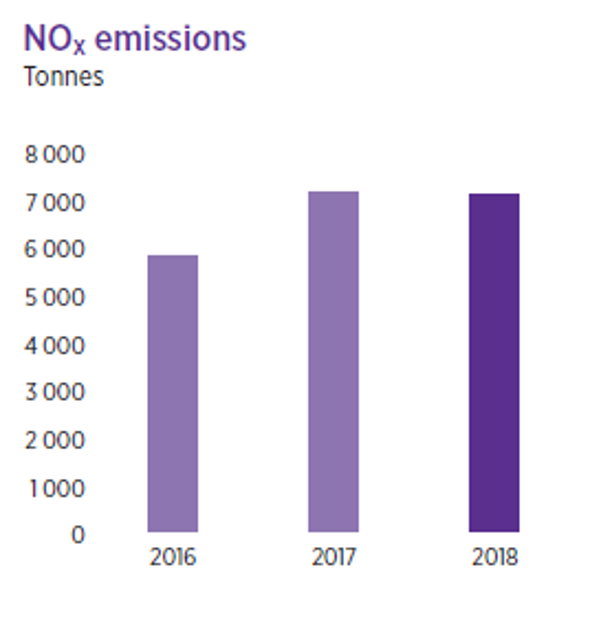
二氧化硫
2018 年,埃肯排放了 9,000 公吨二氧化硫,和2017年的7,900 公吨相比排放量增加了。要降低二氧化硫的排放量,传统上主要关注的是采购硫含量较低的原材料。由于这种潜力有限,因此在可行的情况下也考虑使用洗涤系统。2018 年,埃肯碳(挪威)公司在挪威二氧化硫基金的支持下完成了大型 二氧化硫过滤器的安装。遗憾的是,由于技术问题,该装置未按预期运行,事实上,在 2018 年大部分时间内都未运行。这些技术问题将在 2019 年初解决。埃肯 Bjølvefossen 还在评估一个类似的项目。
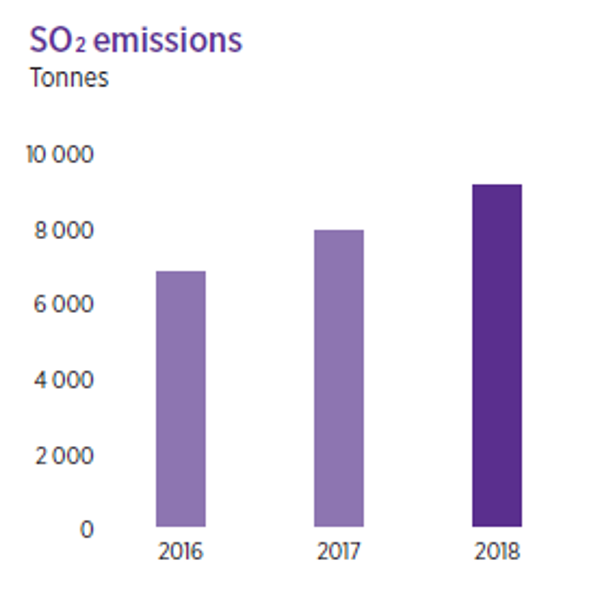
粉尘
埃肯分配了大量资源来控制粉尘。然而,极高的温度和快速分散的超细颗粒使捕获生产过程中产生的粉尘特别困难。
2018 年,埃肯排放了 180 万公吨粉尘(微粒 / 颗粒物)。2017 年埃肯排放了 200 万公吨粉尘,这个数值下降了 10%。让人欢欣鼓舞,这是公司持续改进的结果。根据 2015年的数据,我们的总体目标是到 2025年将粉尘的排放量减少 30%。我们很高兴看到我们正在朝着这个目标前进。
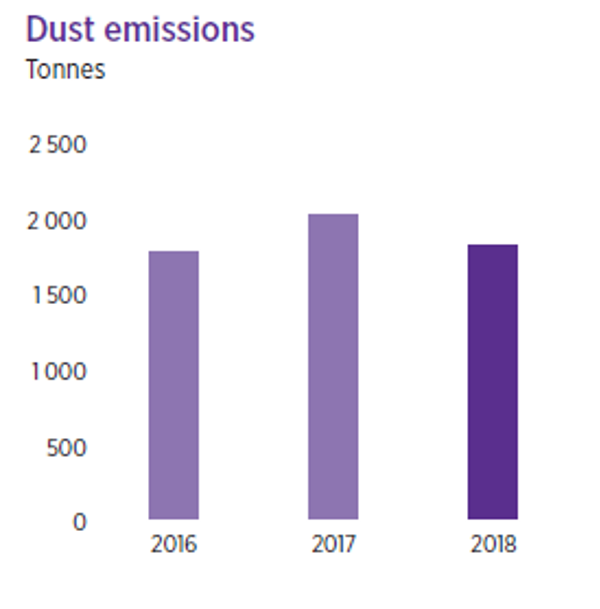
目标
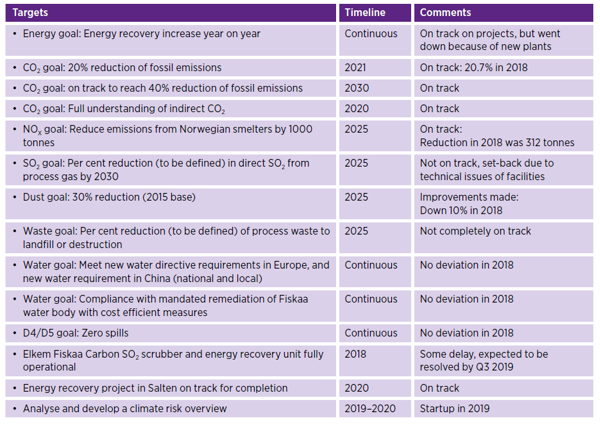
具有吸引力的雇主
努力成为更好的工作场所
技术熟练、勤奋忠诚的员工是我们成功的基础,埃肯必须努力保持对员工的吸引力,既要留住已有的员工,又要吸引新员工。需要采取行动的重要领域是健康和安全、培训和能力建设,以及促进平等和多样性。
技术熟练、勤奋忠诚的员工是我们成功的基础,埃肯必须努力保持对员工的吸引力,既要留住已有的员工,又要吸引新员工。为此,需要采取行动的重要领域是健康和安全、培训和能力建设,以及促进平等和多样性。
环境、健康和安全 (EHS) 是公司业务的支柱,始终是我们的首要任务。我们在 EHS 方面的努力基于零伤害理念。我们员工的安全至关重要。我们坚信,并已在许多工厂证明,我们的生产不会对员工造成任何伤害。
在强大的公司文化的支持下,我们致力于成为一个具有吸引力的、强调安全性的雇主,保护新老员工的利益。组织发展、持续的人才管理和系统性能力发展是公司
发展和 成功的关键,尤其是目前,我们公司正在成长。
埃肯收购了中国的两家工厂——兰州的永登硅材料厂和江西的星火有机硅工厂,拥有 6200 多名同事,这相当于公司员工增加了 35%。
2018 年,埃肯的合同工人数为 833 人。合同工(承包商员工)在埃肯的工厂和全球其他设施提供各种服务,并遵守与我们自己的员工相同的 EHS 要求。合同工接受企业的培训和跟进审核,以确保他们拥有安全健康的工作环境。2018 年,亚洲承包商员工总数为 633 人,欧洲 146 人,非洲 0 人,美洲 54 人。
共同文化:埃肯业务系统
与所有组织一样,埃肯会与时俱进,公司文化也随之发展。埃肯的价值观是参与、尊重、精准和持续改进。与埃肯业务系统 (EBS) 一起,这些价值观构成了埃肯公司的核心文化。EBS 是我们的业务理念和工具箱,为所有员工提供共同的语言和工作方法,既推动企业的商业成功、也促进员工个人事业的发展。EBS 涵盖所有工作领域,包括生产力、质量和成本效益。EBS 方法和理念适用于整个组织,员工培训是我们的首要任务。
职业健康与安全
有人认为工伤或疾病是我们行业不可避免的事实,埃肯绝不接受这个观点。全面了解有关健康和安全的风险和挑战是所有工厂的首要任务。埃肯的统计数据清楚地表明,大量劳动力在不受伤的情况下执行困难和具有潜在危险的操作是完全可能的。我们的几家工厂已经连续多年实现了这一目标。每周埃肯的事业部和集团管理层都会讨论埃肯的安全工作。
然而,埃肯的生产过程确实面临着许多健康挑战,需要每天都认真应对。可能导致职业病的主要风险包括:
- 在采矿、运输和储存石英时接触石英粉尘,在熔炼车间接触二氧化硅粉尘,这些都可能会导致肺部疾病。
- 碳糊生产中会出现致癌性的 PAH 成分。
- 在生产硅氧烷和有机硅产品的化学反应过程中可能会接触到有毒化学品。
- 噪音伤害风险。
- 工作时的姿势会形成人体工程学挑战,时间一长,可能导致肌肉骨骼损伤。
所有这些风险都在每个相应场所进行了仔细应对和管理,包括控制风险、调整工作和工作站,并在必要时为所有员工免费提供个人防护装备。多年来,我们还实施了许多举措,通过减少 / 消除粉尘和噪音源以及替代生产过程中的有害物质来减少伤害风险。
接触有害粉尘、化学品和噪音的员工也需要进行长期的医疗跟进。雇佣新的员工时,我们会为员工进行体检,为他们的健康状况设定基线,随后我们会为员工进行定期医疗检查跟进,确保其健康状况不会随着时间的推移而改变。
工伤严重程度
埃肯根据工伤对受伤人员健康和能力的短期和长期影响来衡量工伤严重程度。我们使用 OSHA 对可记录工伤的定义进行报告,将损失工作日的工伤定义为 H1,医疗治疗 / 受限工作工伤定义为 H2。
2018 年,我们达到了埃肯历史上第二好的总可记录工伤率(H1+H2),每百万工作小时有 2.2 起工伤,而 2017 年这个数值是 3.1。2015 年我们的工伤率最低,每百万工时 1.8起工伤。工伤率降低的原因,部分在于我们企业的增长,即工作时间的大幅增加,不过我们也看到自己员工的可记录工伤率有很好的改善。遗憾的是,我们的承包商员工工伤率从 2017 年的 13 起增加到了 20 起。这再次表明,我们决不能忽视我们的零伤害理念和目标。
在埃肯,工伤严重程度分为低、中和高三个程度。轻度工伤不会造成永久性损害,恢复时间较短,中度工伤虽然恢复时间较长,但不会造成重大永久性损害,而重度工伤会造成重大永久性损害或最坏情况:死亡。
尽管埃肯的总可记录工伤率在 2018 年创下历史新低,但其严重程度却有所上升。2017 年,我们发生了三起重度工伤,而 2018 年的重度工伤数量增加至八起。2018 年,所有可记录工伤(自己员工和承包商)中有 83.4% 被记录为轻度和中度工伤。2017 年轻度和中度工伤的比例是95.3%,由于重度工伤的增加, 2018年这个数值明显下降了。
埃肯在 2018 年没有死亡事件。
缺勤率
缺勤是埃肯健康营运的关键绩效指标。2018 年以可用工作日百分比计算的平均缺勤率为 2.5%,与 2017 年的 3.5% 相比,有所下降。自 2011 年以来,缺勤率一直呈下降趋势,今年的缺勤率达到九年来的最低水平。部分原因是和欧洲相比请病假要求更高的地方增加了,不过这也说明了埃肯有着非常狼性的工作文化。病假中有较小的比例和工作有关。为提高埃肯工厂的健康和安全程度,我们正在采取的措施包括评估工作环境,并在人体工程学、化学品控制以及噪音和粉尘减少方面做出改进。
职业病发病率
在过去三年中,埃肯职业病发病率很低。其中大多数是与人体工程学有关的压迫和疼痛。此外,还有几起与粉尘接触有关的肺病报告,但没有完全记录为工伤。所有这些职业病都发生在欧洲。
多元化和平等性
埃肯致力于打造包容的环境,为所有员工提供平等的机会。我们认可并认识到,每个人都是独一无二且有价值的,他们的个人能力都应得到尊重。我们绝不接受基于性别、宗教、种族、国籍或民族、文化背景、社会团体、残疾、性取向、婚姻状况、年龄或政治观点的任何形式的骚扰或歧视。
埃肯是一家跨国公司,业务遍及四大洲。拥有与这种全球强大业务相配的、具有多元化文化和个人背景的员工,是公司取得成功的必要条件。埃肯是特别关注当地人的利益,无论我们在哪里,都致力于雇佣当地管理层和员工。
遵守非歧视原则是每个部门经理的责任。埃肯拥有一个内部通知系统( " 举报 "),员工可以使用该系统来举报他们认为的可能违反埃肯道德准则或其他可能的不道德或非法行为。这可用于向管理层警示歧视事件。
2017 年和 2018 年期间,有关性骚扰的 #metoo 活动,在埃肯多家公司中引起了相应的宣传和讨论。2018 年,我们制定了一个关于多元化和包容性的试点项目,首次研讨会将于 2019 年初举行。研讨会的重点将是我们日常工作中可能会出现的不同类型的歧视和可能的道德困境。我们将对试点进行评估,并考虑在整个集团内推广。
2018 年的事件
2017 年有一例口头性骚扰事件被报告给公司。该案件是按照埃肯所规定的程序处理的。这个案子在 2018 年处理,结果是终止雇佣关系。
女性比例:
加工行业通常男性居多。然而,女性对我们行业的工作表现出了越来越多的兴趣,因为越来越多的自动化技术减少了繁重的体力工作,而且我们关注环境、健康和安全,这就创造了更好的工作环境,使得我们的营运更可持续。埃肯重视性别多样性,每一年都更致力于性别平衡。
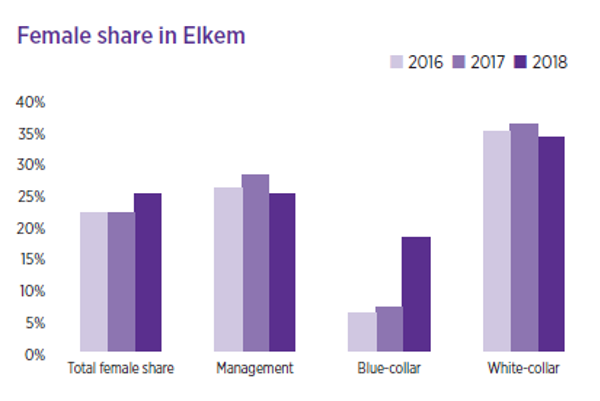
过去几年,埃肯的女性员工比例一直是 22%,保持稳定。2018 年,由于埃肯星火有机硅和埃肯永登硅材料的加入,我们公司的女性比例增加到 25%。亚洲是女性员工人数最多的地区,女性员工占 29%。
由于星火有机硅 和永登硅材料工厂使埃肯的员工人数增加了 35%,因此任何变化都是非常自然的。这一整合带来了积极变化,2018 年蓝领女性就
业率从 7% 大幅增加到 18%。
然而,埃肯的女性领导者比例有所下降。为了提高女性领导者的比例,我们采取的一个具体行动是积极鼓励女性在企业内部申请管理职位。受邀参加埃肯领导力培训课程的参与者中至少有 50% 是女性。2018 年,该课程的女性参与
率仅为 25%。
2018 年,埃肯没有集团级别的年龄分组和比例数据。
董事会和管理层
埃肯董事会由来自德国、法国、中国和挪威的八名成员组成。
董事会的女性比例为 50%。八名董事中有一名年龄在 30-50 岁之间。其余成员为51岁或以上。没有任何董事会成员来自于少数群体。
埃肯的企业管理团队由 10 人组成。只有一名是女性。其中两名成员年龄在 30 至 50 岁之间,其余成员年龄在 51 岁或以上。2018 年,埃肯开始对各事业部领导
和董事会中的女性比例进行统计,以更好地了解领导层的性别比例并开始跟踪这个数据。结果显示了组织内部的巨大差异。某些地方,女性占内部委员会和工厂管理层的 50%,其他地方的董事会或管理层根本没有女性。
发展和培训
埃肯活跃于众多要求严苛的市场,始终需要持续发展和不断改进。我们的改进工作必须要有针对性、要速度快、质量高。埃肯积极利用员工的日常工作情境,将其作为学习的主要场所。我们相信,发展新技能的最佳方式是基于 EBS 原则,参与实际改进工作和问题解决之中。我们还认为:承担新的责任是非常重要的学习和发展方式。为了加强我们的“做中学”的理念,我们还提供了一系列内部培训课程。各种技能培训是员工个人发展计划的一部分。
埃肯的全球目标是,所有职位和地点的所有员工应与其领导进行年度发展讨论,完成率应达到100%。2018 年,59% 的员工进行了此类讨论。在这一点上,83% 的所有埃肯单位实现了 90% 或更高的年度发展讨论的完成率。永登硅材料和星火有机硅排除在外,接受发展讨论的员工人数为 91%,这是我们在公司看到的最好的数字之一。74% 的工厂实现了 2018 年的 100% 目标。2019 年,我们将加大努力,尤其是在我们的两个新工厂,
实现在整个组织内完成率 100% 的目标。
离职率
员工离职率是吸引力的一个指标,说明了埃肯在留住员工方面的表现。离职率是指所谓的离职者,即离开埃肯的员工比例,不包括退休和其他类似情况。埃肯集团的总离职率为 5.4%,和2017 年的 6%相比,有所 下降。


新员工中女性比例总计为22.5%,离职员工中女性比例为 22.8%。集团层面不能提供不同年龄分组的比例。
集体谈判协议
埃肯遵守我们运营所在所有国家 / 地区有关结社自由的当地法律要求。根据挪威公司法的规定,员工在埃肯董事会有两名代表和两名观察员。
结社的级别因国家 / 地区而异。在某些国家 / 地区,员工会根据集体谈判协议进行组织。在其他国家 / 地区,埃肯实体中没有工会。埃肯支持行使结社自由和集体谈判的权利,并与工会进行良好的合作。这也包括我们供应商的员工,他们的相关权力在合同协议中进行了规定。关于集体谈判协议涵盖的员工人数的信息,目前无法提供。
童工和强迫劳动
埃肯在几个存在童工和强迫劳动风险的国家开展业务,尤其是印度、马来西亚和巴拉圭。
部分供应商的生产现场或我们自己的工厂风险很高,必须由受过培训且符合资格的成年人完成相关工作。
在埃肯工作的年龄限制是 18 岁,部分假期短工和高职学生的年龄限制可放宽到 16 岁。他们只允许从事被视为安全且与学业没有冲突的简单轻松工作。
埃肯的供应商受合同约束,必须禁止 15 岁以下儿童(部分特定国家/地区规定为 14 岁)在其工厂工作,并明确规定仅 18 岁以上的人员才能从事危险工作和夜间工作。埃肯遵守《联合国人权和商业指导原则》。
2018 年的事件:
2018 年,埃肯或我们的供应商没有发生童工或强迫劳动的事件。
目标
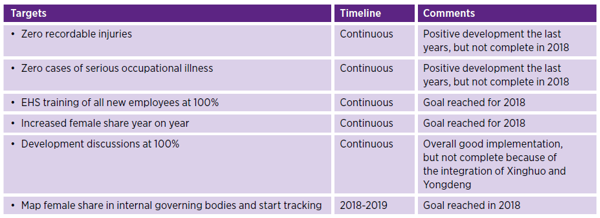
可持续发展、降低碳足迹
埃肯运营的整个价值链都对社会有着重大的影响。除了自有运营外,埃肯还由于采购原材料、资本货物和服务等形成了较大的碳足迹。我们为供应链中的道德行为和社会责任设定了高标准,并对其进行密切监控。
这种影响有积极和消极的一面。积极的一面是,除了开发和生产对我们的生活方式、气候变化所导致的社会变革至关重要的产品和材料之外,我们的运营还创造了稳定的就业和税收。消极的一面是高能耗和有害排放,这些都必须密切监控并有效减轻。
在向低碳社会的转型中,加工行业发挥着重要作用。除了减少自身排放、提高能源效率外,埃肯还提供全球其他业务和行业转型所需的材料、技术和解决方案,为绿色转型做出贡献。太阳能电池板、风力发电厂、电动汽车、低排放交通工具和基础设施、智能手机、电池和电缆都依赖于像埃肯这样的公司所生产的产品和材料。
全球大趋势影响我们的业务战略,推动埃肯产品和解决方案的增长。这意味着我们必须特种化。埃肯的产品服务于六大趋势所驱动的需求,这对埃肯具有重要的战略意义:可持续性、能源需求、快速城市化、生活水平的提高、人口老龄化和人口增长以及数字化。在左侧的插图中,您可以看到不同的全球趋势如何影响我们的流程、产品和解决方案,以及我们如何为联合国可持续发展目标做出贡献。埃肯相信,可持续发展既是一项责任,也是我们在行业中处于领先地位并在未来保持竞争力的先决条件。
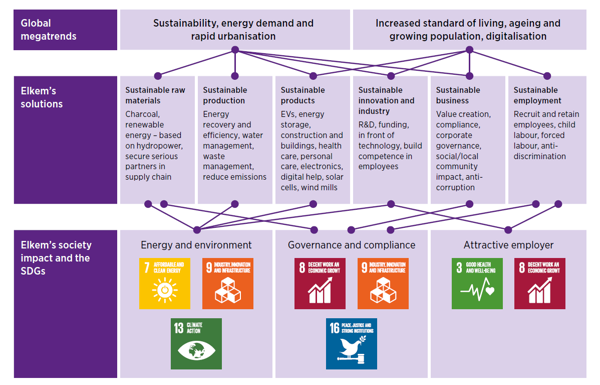
供应链和原材料
埃肯集团为其遍布全球的运营网采购原材料、资本货物和各种服务。埃肯制定了很高的道德、环境和社会标准,无论什么公司,都必须满足这些标准才能成为我们的供应商。
埃肯的企业供应链职能部门负责全面制定和维护埃肯的采购和物流战略和政策。埃肯的主要采购类别是原材料、设备以及现场施工和现场维护服务。该职能部门在公司所有事业部开展国际工作,重点是以可持续的方式降低埃肯的采购和物流总成本。
2018年,埃肯的采购总支出约为 150 亿挪威克朗,涵盖原料、材料、能源、商品、服务和物流的供应。埃肯的供应基地非常活跃,由全球约 15,000 家供应商组成,其中近 70% 位于欧洲。
供应商要求
成为我们的原材料、商品和服务的供应商之前,任何公司都要根据埃肯在环境、健康和安全、社会责任、反腐败以及合法合规方面的要求进行资格预审。在批准一家公司成为我们的供应商之前应对其进行风险评估。存在风险的供应商需遵守埃肯的详细要求。埃肯还要求供应商及其分包商遵守埃肯的原则。埃肯正在实施改良版数据库和合同管理系统,以确保
这些领域的合规性和有序治理。
埃肯为高风险供应商和承包商制定了针对采矿、运输、存储和装载等运营的健康、安全和环境标准以及详尽要求,并积极参与其中,促使和监控供应商实体为员工提供安全与体面的工作条件。其中包括健康和安全培训,并在必要时为供应商的员工提供适当的个人防护装备。同时还实施年龄控制,以防止童工的出现,并为年轻员工提供负责任的工作条件。埃肯要求供应商和承包商以公平的条款与其员工签订书面合同,并在法律允许的情况下向员工提供有关他们有结社自由和集体谈判权利的信息。
埃肯定期与供应商开会讨论这些规定。高风险供应商必须记录其对运营中法律规范和潜在危险的理解,并提出计划,说明其为埃肯工作时如何消除或控制风险。埃肯进行审计和检查,通常是日常访问以跟进质量、技术和业务,同时也有不预先通知的现场访问。外部审计员还会代表埃肯对供应商进行审计。
除了在必要时提出改进意见外,埃肯还会记录违反埃肯要求的行为,并通过口头或书面警告予以解决。反复违规的情况下,埃肯会要求快速执行改进计划、进行经济处罚或立即终止合同。
供应商筛选
我们的工厂和项目需要原材料、硬件和服务,供应商的筛选必须采用社会和环境标准。2019 年埃肯的目标是继续改进供应商筛选和跟进的文件记录,并实施全球供应链风险管理制度。
供应商审计
原材料的供应商数量较少,埃肯制定了结构化审计计划,确保所有供应商都接受定期审计。硬件、工厂设备和维修等商品和服务的供应商数量很大。埃肯会根据社会和环境标准对新供应商进行评估,并由工厂人员或企业人员进行定期审计。2018 年,埃肯与一个全球供应链风险管理解决方案供应商建立了合作伙伴关系,在一个门户网站中随时更新新老供应商的信息,确保其当前资格状态和能力的广泛可见性,以此来支持埃肯与新老供应商的合约关系。该系统还将集中保存供应商审计信息。
当地社区
当地社区的意见是帮助我们改进的宝贵信息。我们与当地社区的对话中出现的关键话题包括社区发展项目、工作安全、安全运营、排放和其他环境问题,以及与工厂相关的交通活动。当地社区提出的投诉以及与我们运营相关的交通事件均根据事故和偏差管理的良好实践进行登记和管理。
与当地社区的对话由各工厂或现场经理负责,并以正式和非正式的日常工作方式进行。埃肯的许多工厂都制定了当地倡议和支持计划,以改善教育、提倡体育活动、改善当地基础设施、促进当地社区减贫 / 提供食品支持或其他社会影响倡议。我们提供了清晰的反腐败措施指南。
成为当地和地区正式网络的一员,也是了解当地和地区社区需求的重要方式。埃肯的一些工厂是商业组织、研发集群或其他网络的成员。在我们的利益相关者调查中,65% 的参与者表示他们的单位是某种本地 / 区域网络的一部分。
利益相关方
有关利益相关方的关键问题
员工
安全的工作、EHS 高标准、可持续的工作状况、发展 / 职业机会、促进 EHS 和业务改进、工资、福利和薪酬(员工福利)、平等机会、可持续性 (CSR) 。
政府
环境法规、工业实践和信任、良好的环保效果、公开沟通、遵守法律—— 劳动和环境、社区发展、工资税、积极参与对话、与消防和警察协调。
管理
EHS 效果、财务业绩、战略方向、企业道德、企业社会责任问题、合规性、遵守行为准则、可持续业务、领导力发展、完全遵守法律。
客户
产品质量高、合作伙伴可靠、供应链协调良好、技术不断改进、定价公平 / 合理、符合道德和负责任的行为、及时交付产品、产品创新。
供应商
道德和负责任的行为、增值、反腐败工作、反贿赂工作、高度可信赖的合作伙伴、运输。
当地社区
社区支持 / 发展,EHS,可持续业务,就业前景,可靠雇主,在社区中进行宣传,公开可信的对话,环境绩效和认知。
工会
尊重协议、良好的工作氛围、良好的对话、建设性的合作关系。
股东
利润、战略方向、 EHS 成果。
联系我们
与全球领先的材料制造商携手,将您的企业提升到一个新的水平。